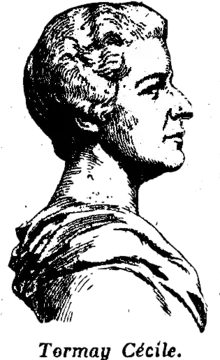Cécile Tormay
Cécile Tormay (8 October 1876 in Budapest – 2 April 1937 in Mátraháza) was a Hungarian writer, intellectual, right-wing political activist, literary translator, and social theorist.
| Cécile Tormay | |
|---|---|
 Cécile Tormay in Napkelet lexikon | |
| Born | 8 October 1876, 8 October 1875 Budapest |
| Died | 2 April 1937 |
Both her parents were of German origin. Her maternal great-grandfather, József Spiegel (Tüköry de Algyest), was a building contractor, helped István Széchenyi build the Chain Bridge. Her fraternal grandfather, Károly Krenmüller (Tormay), took part in the 1848-49 revolution as an army major. The Tormay family received nobility in the late 19th century. Her father, Béla Tormay, was widely recognized as an expert on agriculture, was a member of the Hungarian Academy of Sciences and a State Secretary. Her mother was Hermin Barkassy. Cécile was a private student, she studied literary works in German, Italian, French and Latin. She translated the Little Flowers of St. Francis of Assisi into Hungarian.
In 1919 she began expressing her political views, and opposed the Béla Kun regime. She published a book (An Outlaw's Diary (Bujdosó könyv, 1925, literally The Proscribed Book)) about the events of the 1918–1919 revolution, protesting against the subsequent communist government and regretting the division of the Kingdom of Hungary.
She was a great admirer of Mussolini. In 1932, on the tenth anniversary of the March on Rome, she met the Italian dictator, presenting him the good wishes of her Hungarian women's league in a speech in Italian.[1]
She is known for two novels (People of the Rocks (Emberek a kövek között), 1911; The Old House (A Régi ház), 1914) and five short stories. Her most famous work, "An outlaw's diary", is a first hand account of the terror committed by communists during the short-lived Hungarian Communist Republic in 1919. She was nominated for Nobel Prize in Literature twice: in 1936 and in 1937.[2][3]
References
- Hungarian translation of the speech of Cécile Tormay in Rome
- "The Nomination Database for the Nobel Prize in Literature, 1901–1950".
- "Nomination Database". www.nobelprize.org. Retrieved 2017-04-19.
Sources
- An outlaw's diary (1923)
- Budapest wants to name a street after the antisemitic writer (in German, citates from Tormay in English)
- Jewish federation asks Budapest mayor to withdraw renaming of street after alleged anti-Semite